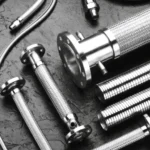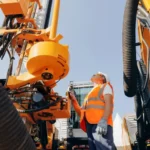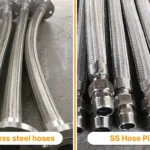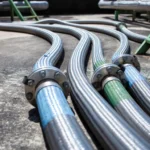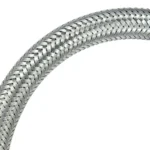Top Benefits of High Pressure Stainless Steel Hoses
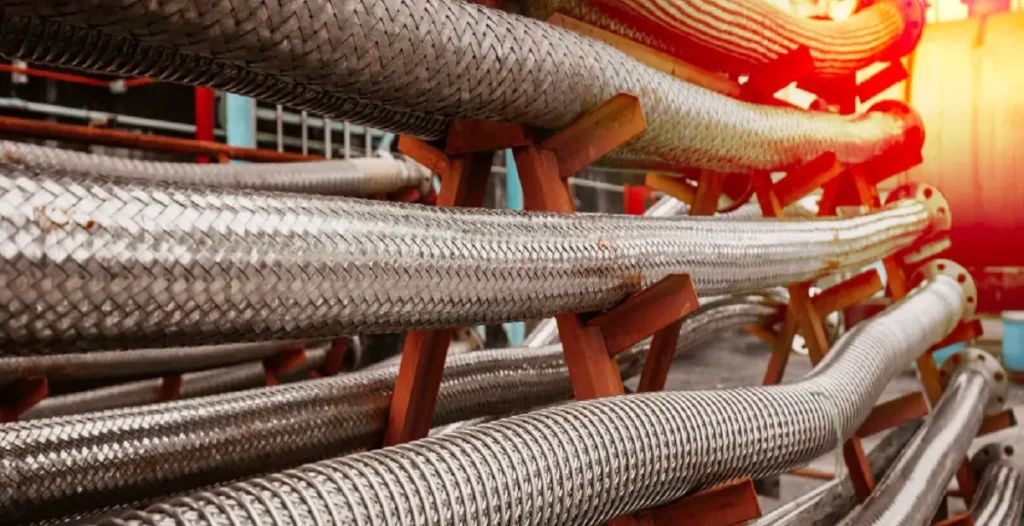
High-temperature stainless steel hoses are essential for various industries, ensuring equipment performance and minimizing damage risk. Among the available options, stainless steel hoses stand out due to their exceptional heat resistance. Capable of withstanding temperatures up to 800 degrees Fahrenheit, stainless steel flexible hoses are ideal for demanding industrial applications.
In this article, we explore the benefits of stainless steel hoses and their crucial role in high-pressure environments. At QualityFlex, we lead the industry in providing top-quality stainless steel flex hoses designed to meet specific requirements. Our high-pressure stainless steel hoses are engineered for durability and reliability, making them a key choice for industries needing efficient fluid or gas transfer. Discover how stainless steel hoses can enhance performance and safety in your operations.
Interested in high-pressure stainless steel hoses? Get more information from QualityFlex.
What is a High Pressure Stainless Steel Hoses?
A high-pressure stainless steel hose is a specialized hose designed to handle fluids or gas under high pressure. Made from durable stainless steel, this hose is reinforced to ensure it can withstand significant pressure without failing.
Stainless steel flex hoses offer excellent strength and flexibility, making them suitable for demanding applications where reliability is crucial. These hoses are commonly used in various industries, including manufacturing and transportation, where they manage high-pressure environments effectively. Their robust construction helps prevent leaks and ensures long-lasting performance, making them a dependable choice for industrial applications.
Want to know more about our Stainless Steel Hoses? Check out our product page for all the details and find the right one for your needs!
Key Features of High-Pressure Stainless Steel Hoses
- Heat Resistance & Thermal Conductivity: Handles temperatures from -425°F to 1200°F with low thermal conductivity, ideal for high-heat applications.
- Corrosion Resistance & Durability: Contains 10.5% chromium for rust and chemical resistance, ensuring long-lasting performance.
- Flexibility & Maneuverability: Stainless steel flexible hoses offer excellent flexibility and can withstand high pressures without losing integrity.
Benefits of High-Pressure Stainless Steel Hoses
- Enhanced Safety and Reliability
High-pressure stainless steel hoses are built to last and handle extreme conditions safely. Their strong metal construction ensures reliability and reduces the risk of failures, even in high-pressure or high-temperature settings. - Improved Performance and Efficiency
Stainless steel flex hoses are designed for efficiency with direct welding of fittings, making them ideal for tight spaces. Their flexible design and external braiding also help reduce vibrations, improving overall performance. - Cost-Effectiveness and Long-Term Savings
Stainless steel hoses are a smart investment due to their long lifespan and low maintenance needs. Properly installed, they can last over 20 years, providing reliable service and saving money on replacements.
Versatility and Compatibility
Stainless steel flexible hoses are versatile and compatible with many applications, from industrial furnaces to car exhaust systems. Available in various sizes and specifications, they fit a wide range of needs.
Ready to enhance your operations with our high-quality stainless steel hoses?
Applications of High-Temperature Stainless Steel Hoses
- Industrial Uses
Stainless steel flexible hoses are crucial in refineries, chemical plants, and power plants due to their heat and corrosion resistance. They’re also used in shipbuilding and water treatment for efficient and durable fluid transfer. - Automotive and Transportation
In vehicles, stainless steel flex hoses manage coolant flow between the radiator and engine, handling high temperatures and ensuring smooth engine operation. - Aerospace and Aviation
Stainless steel hoses are essential for fuel lines and rocket engines in aerospace. Their durability and heat resistance make them suitable for both aircraft and spacecraft. - HVAC Systems
For HVAC systems, stainless steel hoses are preferred for their flexibility and resistance to heat and corrosion, ensuring reliable air and fluid transfer. - Pharmaceutical and Biotechnology
In pharma and biotech, stainless steel hoses are used for their easy cleaning and chemical resistance, supporting safe and efficient fluid transport. - Research and Development
In labs, stainless steel hoses connect equipment for fluid and chemical transfer, making them ideal for experiments and testing.
Conclusion
High-temperature stainless steel hoses are essential for many industries because they are durable and efficient. They perform well in tough setups and last a long time. To keep your operations running smoothly and avoid downtime, it’s important to choose the right equipment. Stainless steel hoses offer great benefits, such as durability and strong performance.
At QualityFlex, we provide high-pressure stainless steel hoses made to withstand harsh conditions. Our hoses are durable, flexible, and can handle high pressure. They’re perfect for demanding jobs and reliable fluid transfer. For more information about our high-pressure stainless steel hoses, get in touch with QualityFlex today by filling the above form!
FAQ
High-pressure stainless steel hoses can handle a wide range of fluids and gas, including water, steam, oil, and various chemicals. The specific compatibility depends on the hose’s material and construction.
Consider flow rate, pressure, and space constraints. Consult with a specialist or check manufacturer specs for the best fit.
Yes, they are resistant to corrosion and UV damage, making them suitable for outdoor use.
Minimal maintenance: regularly check for damage, leaks, and blockages, and ensure proper installation.
Yes, they generally handle temperatures from -425°F to 1200°F. Check manufacturer guidelines for specifics.
Their resistance to heat, corrosion, and wear, combined with metal strength and flexibility, enhances durability.


